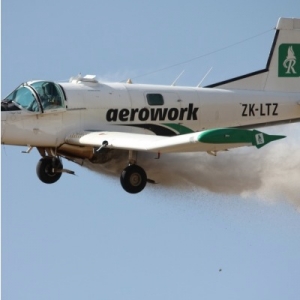Aerial topdressing pilots are already experiencing new automated fertiliser application systems through trials of the new technology associated with the project, the co-op says.
The PGP project aims to assess new aerial sensing technology to inform fertiliser recommendations. The new aerial technology allows for improved accuracy spreading of fertiliser via computer-controlled hopper doors on a standard aerial topdressing aircraft. This will allow for better precision, leading to increased productivity and profitability of hill country farms.
Ravensdown Aerowork pilot Grant Lennox is helping put the theory into practice by trialling the new prototype which he believes will become an expected feature on all aerial topdressing aircraft in the future.
"The automated application of fertiliser is much more effective even in this early stage. I know that I am doing a better job so I am getting more satisfaction out of my work," Lennox says.
"With the inclusion of prescription mapping which highlights the nutrient needs from a fertiliser plan for the farm, I can go to a client and they can have the boundary and spread areas already mapped out and programmed into the GPS before I arrive. This means I can fly backwards and forwards over the target area and know that the land is getting the right amount of fertiliser per hectare."
Today's aerial spreading techniques of broadcast application or blanket coverage are not always as accurate as they need to be – leading to higher costs, lower levels of production and potential impacts on the environment.
Fertiliser is currently dropped via a manual hopper door that is controlled by the pilot but Lennox says there is no way of ensuring the fertiliser has landed on the targeted area.
Recent innovations in remote sensing and imaging mean that the potential for sensing parameters from the air has vastly improved. Hyperspectral cameras are a key part of providing the information which will enable a quicker and cheaper way to assess the nutrient status of farms. Ravensdown Technical Development Manager Michael White says the PGP project presents a transformational change in the way fertiliser is applied and responds on hill country farms.
"Fertiliser is a major investment for sheep and beef farmers so it's important for farmers to get the maximum benefit from their investment in nutrients so they can capture that benefit on farms," he said.

















